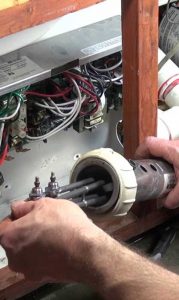Choosing the Right Pool Heaters: Expert Tips
Ever thought about having a warm pool during the cool seasons? It’s pretty great. Pool heaters make it happen – they let us swim comfortably, even when the weather isn’t exactly cooperating. Now, picking a pool heater might seem simple on the surface, but there’s a bit more to it. Let’s dive in and sift through the options together.
Gas Pool Heaters
Kicking things off with a well-known option: gas pool heaters. They’ve been a reliable choice for many over the years. The reason? They heat your pool quickly, providing that instant gratification on a chilly day. But, it’s worth noting they might lean a bit heavy on your monthly budget and aren’t the greenest option out there. If your swims are more of an occasional leisure and you’re all about that quick heat-up, gas heaters might just be for you.
Electric Resistance Heaters
On to electric resistance heaters, which have carved out their spot for being notably eco-friendly. They do a stellar job without depending on the weather, but keep an eye on that electric bill, especially if your pool’s on the larger side. A snug fit for smaller pools or spa areas, especially where gas heating might not be viable, these heaters are both practical and keep your green conscience clear.
The Scoop on Heat Pumps
Then we have heat pumps, the middle-ground marvels of pool heating. Offering a blend of cost-effectiveness over time and a smaller carbon footprint, they’re a dependable choice for many. The compromise? They’re somewhat reliant on having milder weather around and may ask for a bit more upfront financially. If you’re located where winters are more cool than icy and your swims are a regular event, heat pumps offer a solid, reliable choice.

Shining Light on Solar Pool Heaters
Lastly, let’s touch on solar pool heaters, the sun-lovers of the bunch. With almost negligible running costs and a big thumbs up from Mother Earth, they’re a super tempting option. The downsides include dependency on sunny days and potentially demanding quite a bit of space to install. If you’re soaking in regular sunshine and keen to keep ongoing costs low, solar heaters might just beam a light on your pool heating solution.
Navigating Pool Heater Solutions with Fox Pools
Choosing the right pool heater, getting it professionally installed, and ensuring it runs smoothly – there’s quite a bit to navigate. That’s where we, the team at Fox Pools, can help. We’re keen on simplifying this journey for you at every step.
Our expansive suite of services, such as pool repairs, inspections, and liner installations, are meticulously crafted to be your one-stop solution. We ensure that the warmth of your pool remains constant and reliable, no matter the season.
For us, it’s not just about maintaining a comfortable temperature in your pool. It’s about ensuring that every swim, every dip, is a reliable experience, free from unexpected surprises.
At Fox Pools, our knowledge stretches across a multitude of areas, ensuring that when you entrust us with your pool, it’s cared for from every angle. Be it the complex intricacies of pool motors or the critical aspects of plumbing and pump repairs, we bring a robust skill set to the table.
Especially when it comes to pool heaters, we’re attuned to the subtle, yet vital, elements that ensure they operate at their peak, providing you with that consistent, welcoming warmth every time you decide to take a swim.
With our attention to detail and a commitment to maintaining your pool’s optimal condition, we’re here to guide you through every step of your pool’s heating journey, making sure it’s smooth sailing – or, perhaps better said, smooth swimming – throughout.
Our Approach to Installing Pool Heaters
When you reach out to us, we don’t just sell you a heater and install it. We dive into a detailed consultation and selection process, ensuring you’re getting the best fit for your specific needs. Considering the size of your pool, the typical climate in your area, and your overall energy and cost preferences, we align you with a heater that ticks all your boxes. And once we’ve identified the perfect fit, our installation services are smooth, professional, and timely, ensuring you can dip into warmth whenever you wish.
Keeping Things Heated Just Right
At Fox Pools, we’re huge proponents of regular maintenance. Keeping your pool heater in impeccable shape is about regular check-ups to ensure longevity and optimal operation.
Our proficiency in varied pool services, from filter cleaning (be it cartridge, D.E. grid, or sand change) to winterization, means that your pool’s warmth is consistently safeguarded.
In Closing
To sum it up, pool heaters are more than a luxury – they’re a gateway to year-round enjoyment of your pool. Whether you’re leaning towards gas, electric, heat pump, or solar heaters, making an informed decision and keeping up with mindful maintenance are key.
From choosing your heater and installing it, consider us your go-to for keeping your pool perfectly heated.
So, let’s take the plunge together, shall we? Connect with us, and let’s ensure your pool is warm, welcoming, and wonderfully maintained, year round.
















